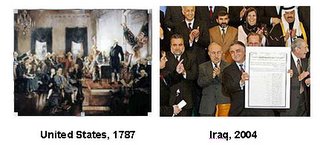Stanley Kurtz connects the dots swimming before his eyes, and deduces that Hollywood homos are trying to slippery-slope us from gang-marriage to gay marriage, using their most fiendish device -- cable TV:
There’s one late-breaking element of this debate that I think deserves more attention: HBO’s new polygamy drama, Big Love. Newsweek is touting the show, which is scheduled to premiere in March in the slot that follows The Sopranos. Any chance that Big Love is meant to make a statement on the gay marriage debate?You got it, bro! Just as Dallas was designed to lure Reagan-era Americans into conspicuous consumption, adultery, and shoulder pads, and Seinfeld fiendishly weakened our collective resolve by implanting facile "observations" into the national psyche, leading to 9/11.
It certainly seems possible. One of Big Love’s lead writers, Will Scheffer, is a playwright.[Sinister music; isn't that Pinter fellow a playwright?]
Scheffer explored themes of gay male identity in “Falling Man, and Other Monologues.” This article makes it clear that a recent staging of that play was designed to make a statement in the battle over same-sex marriage. So it’s suggestive that Scheffer is one of the two creators and executive producers of “Big Love.”"A recent staging of that play was designed"! Please, nobody tell Kurtz about Orson Welles' "Voodoo Macbeth" -- he'll think Shakespeare was trying to turn us all into zombies.
Kurtz's upshot is that "polygamy is being used to legitimate same-sex marriage! In other words, gay marriage and group marriage are mutually reinforcing, and both depend upon the larger view that families ought to be whatever people want them to be."
We know that it is now common practice for conservatives to judge works of art without having actually seen them. Kurtz' latest helps to explain why:
They have no idea what art is. The closest thing to it in their universe is propaganda, so they assume art is just a species of that. (Sometimes they're accidentally right, of course, but having no aesthetics, they cannot make informed judgements.) Therefore any work of art that contains something they find viscerally objectionable -- in Kurtz' case, acts of love that do not involve one man, one woman, and (it would seem) one or fewer orgasms -- is analyzed and denounced as if it were a piece of legislation or a policy paper.
So of course many of them no longer bother to watch the things they denounce: why should they bother?
Another reason to be grateful, folks, in this holiday season: that you don't see the world through so pinched a gaze.


